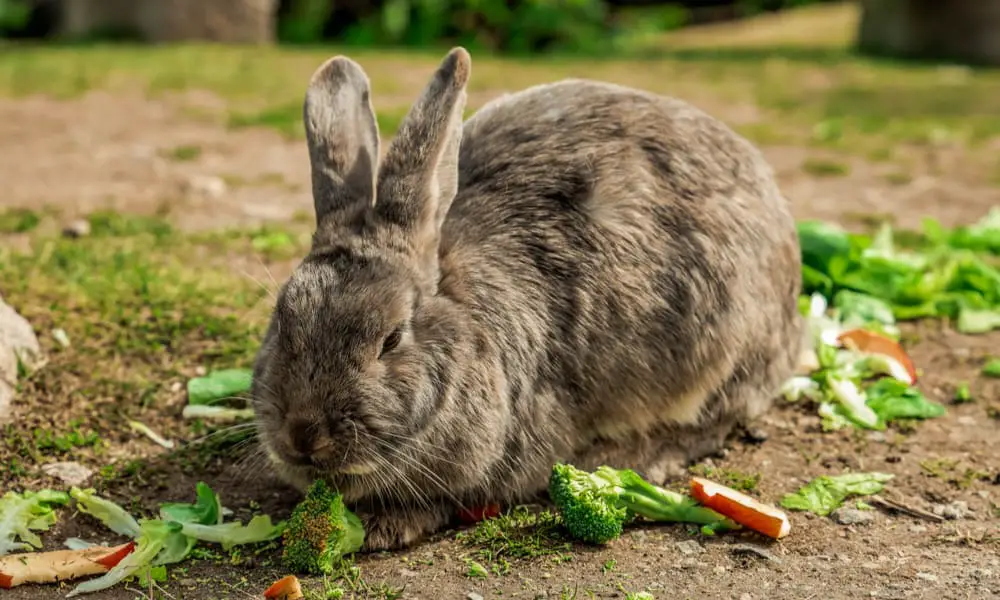Broccoli is a vitamin-packed crispy and crunchy green vegetable from the cabbage family. Its excellent chewy texture makes it a desirable option for rabbits at first glance. However, it is unclear – Can rabbits eat broccoli?
The problem is that this nutrient food creates gases in a bunny’s digestive tract. Therefore, you should avoid offering fresh vegetables, including broccoli, to kits under four months of age. Since some adults may also have a problem with this veggie, you should be careful.
Table of Contents
What Is Broccoli?
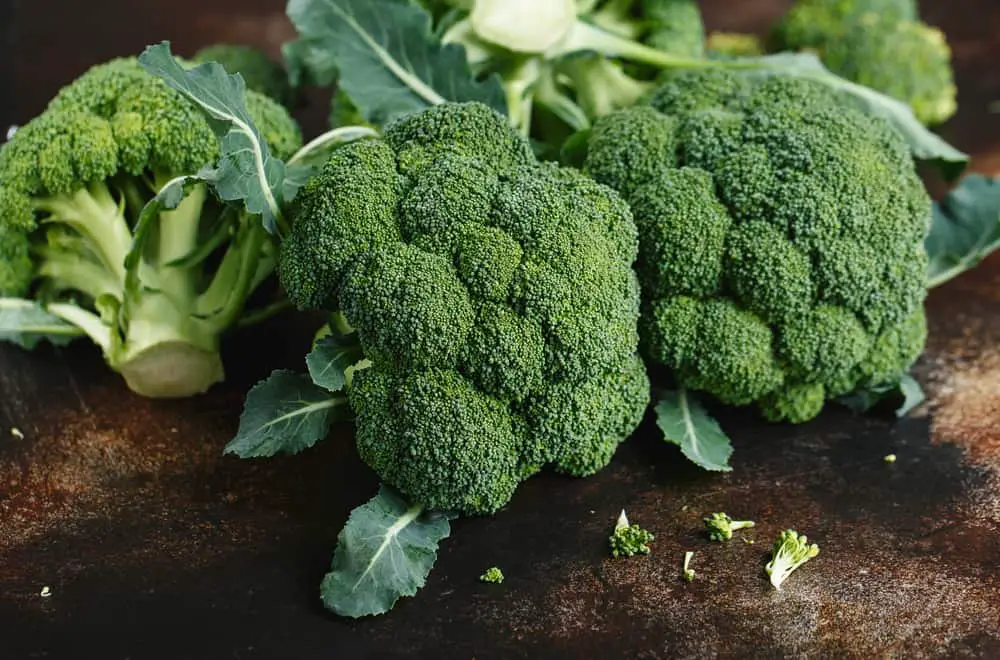
Broccoli (Brassica oleracea var. Italica) is a dark green veggie from the cabbage family. Besides a sizable flowering head surrounded by tiny leaves, it also has thick light green stalks.
This low-calorie vegetable is rich in vitamins, particularly A, C, B, K, and folate. Additionally, it contains numerous minerals, including potassium and manganese.
| Raw broccoli nutritional value for 3.53 ounces (100 g) | |
| Nutrient | Amount |
| Calories | 34 Kcal |
| Protein | 2.82 g |
| Fat | 0.37 g |
| Carbs | 6.64 g |
| Sugar | 1.7 g |
| Fibers | 2.6 g |
| Water | 89.3% |
Broccoli variations for Rabbits
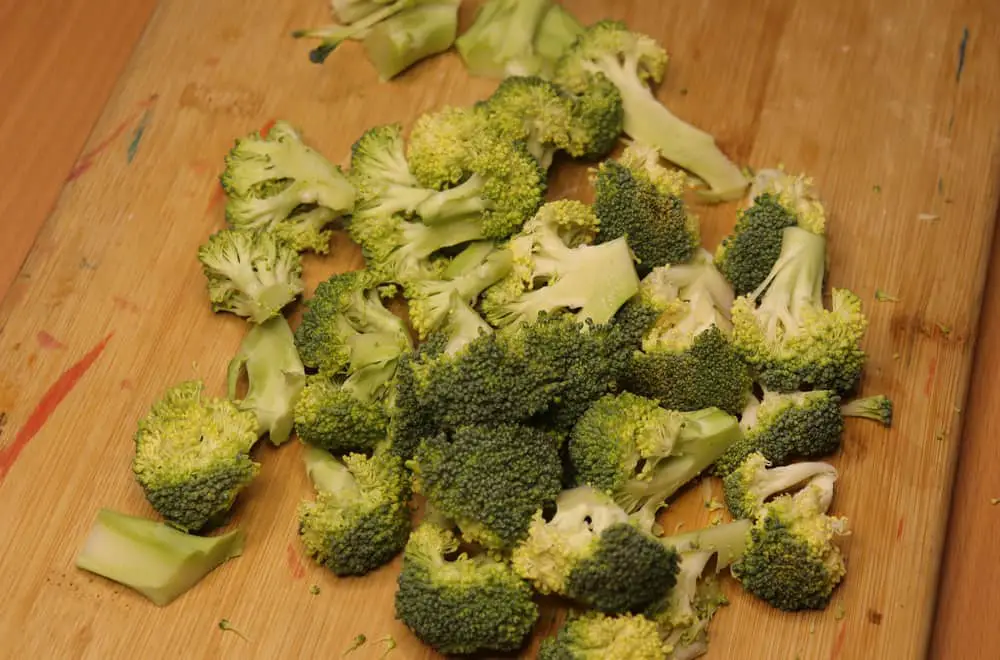
Nowadays, you can find numerous varieties of this yummy vegetable. The most popular cultivars include:
Hybrid varieties
- Belstar broccoli
- Green Magic
- Eastern Magic
- Destiny
- Sun King
Heirloom varieties
- Romanesco
- Calabrese
- Purple Sprouting
- DiCicco
- Waltham 29
Broccoli similar plants
- Broccoli Raab
- Broccolini
- Chinese Broccoli
Can Rabbits Eat Broccoli?
You should always offer a moderate amount of broccoli to your bunny in the very beginning. Once it accepts this veggie, you can feed your pet with one tablespoon of broccoli per 2 pounds (0.91 kg) of its body weight. It is on you to divide that amount into two portions or give it all at once.
Spinach parts appropriate for rabbits
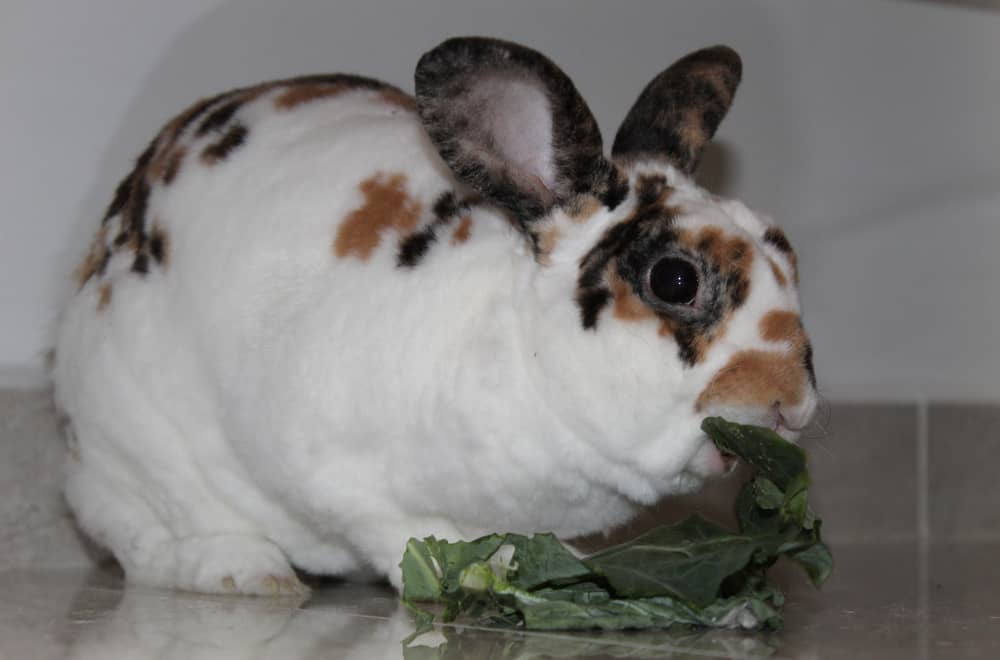
Leaves
Broccoli leaves are packed with fibers, vitamins A and C, and good antioxidants, making them an excellent food for rabbits. Plus, they are much safer and easily digested than florets and stems for these fluffy animals. However, avoid overfeeding your pet since moderation is vital in this case.
Florets
Florets are yummy food for rabbits and cause fewer problems with gasses than stalks. However, rabbits react differently after consuming this food type, so you should be careful and introduce it gradually.
Stalks and stems
Since broccoli stalks are toxic-free, you can offer them to your long-eared friend without fear. They can be solid and hard, so you should cut them into small pieces before serving. They are an excellent solution for rabbits’ dental health, but too many stalks and stems can cause problems with gasses.
Cooked broccoli
Rabbits typically enjoy raw broccoli full of healthy nutrients. However, you can also offer this veggie to your pet cooked since it is a pretty weird plant. In most cases, raw foods contain more nutrients than cooked ones, but it is not the case with broccoli.
- A portion of 100 g of raw broccoli contains 2.6 g of fiber
- A portion of 100 g of cooked broccoli contains 3.3 g of fiber
Is Broccoli Safe for Rabbits?
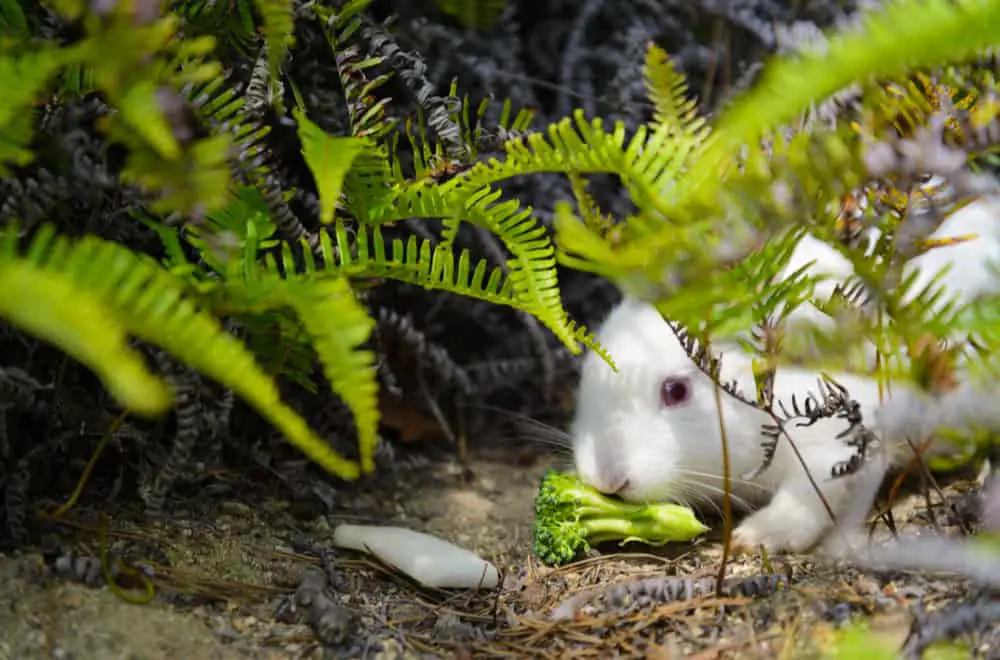
Broccoli is a safe and beneficial food for rabbits as long as you avoid overdoing the amount given at once. In high quantities, this veggie causes gas accumulation in the rabbit’s digestive system.
Therefore, you need to be careful when offering broccoli to your bunny for the first time. It is recommended to spend some time monitoring it to notice possible signs of discomfort and react timely when necessary.
| Raw broccoli nutritional value for 3.53 ounces (100 g) | |
| Vitamins and minerals | Amount |
| Vitamin A | 31 μg |
| Vitamin C | 65 mg |
| Vitamin K | 101.6 μg |
| Vitamin E | 0.78 mg |
| Vitamin B6 | 0.175 mg |
| Folate | 63 μg |
| b-carotene | 361 μg |
| Calcium | 47 mg |
| Phosphorus | 66 mg |
| Potassium | 293 mg |
| Sodium | 33 mg |
| Magnesium | 20 mg |
| Iron | 0.73 mg |
| Manganese | 0.21 mg |
Always start with a leaf or two per day and check its stools for changes. If there are not any, you can gradually increase this amount. The procedure requires time and effort, but it pays off in the long run since this vegetable is packed with valuable nutrients.
Since broccoli affects dental wear, you should add it to your pet’s diet when possible. In an ideal situation, a rabbit can consume even tougher florets and stalks that contain more necessary fibers.
You can find numerous broccoli types on the market, but only a few are entirely safe for bunnies, including:
- Sprouting broccoli
- Calabrese broccoli
- Purple cauliflower
Your rabbit will enjoy nibbling crispy stems and bright green flowers full of antioxidants, vitamins, and fiber.
Remember that every sudden food change and quick new ingredients introduction can result in stomach upsets. The rule of thumb is that you need at least two weeks to change your rabbit’s diet.
It is vital to stop with particular food as soon as you notice any sign of digestive problems, such as:
- Bloated abdomen and gurgling in the belly
- Hard stomach painful to touch
- Reduced appetite
- Painful tooth grinding
- Diarrhea or less poop
- Lethargy and probable collapse
Once you notice these changes, your primary goal is to take your bunny to the vet. Only appropriate treatment can help it and probably save its life.
Broccoli for kits
The rule of thumb is to avoid feeding baby rabbits (kits) broccoli until they are at least four months old since they have different dietary needs than adults. Some vets recommend introducing it only after six months.
This veggie typically generates gases in their digestive tract and jeopardizes their overall health. Therefore, always offer small amounts two to three times a week when they are old enough.
How Much Broccoli to Offer Your Bunny?
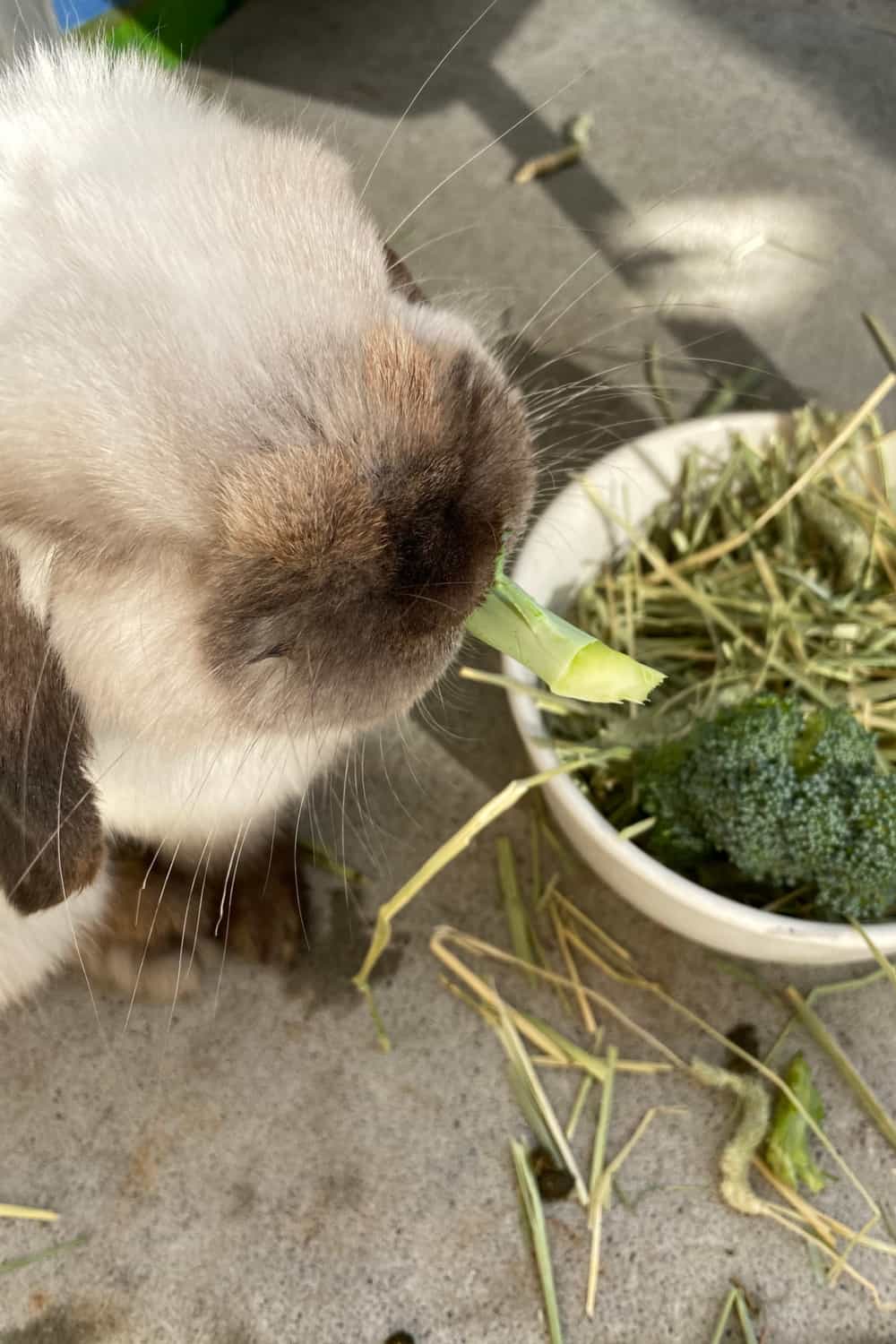
The amount of broccoli safe for rabbits depends on each individual. While some digest it without visible problems, others with more sensitive stomachs will negatively react within a few hours, even minutes.
Therefore, you should always start with leaves since they produce less gas than stems and florets. Vets often recommend offering only leaves to bunnies, particularly the young, but never in the first four months of age.
If you want your pet to get the nutritional benefits of this veggie, you should start slowly. The best way is to start with one tablespoon per 2 pounds (0.9 kg) of your bunny’s body weight.
Repeat the procedure after two to three days of break. If everything goes well, you can add this veggie to your rabbit’s regular diet approximately once or twice a week.
Always mix three or four vegetables and a piece of fruit daily, but their total amount should be at most 10 to 15% of the daily meal. Try to change the mixture daily to make meals varied, nutritious, and interesting for the bunny.
Proper Way to Feed Rabbits with Broccoli
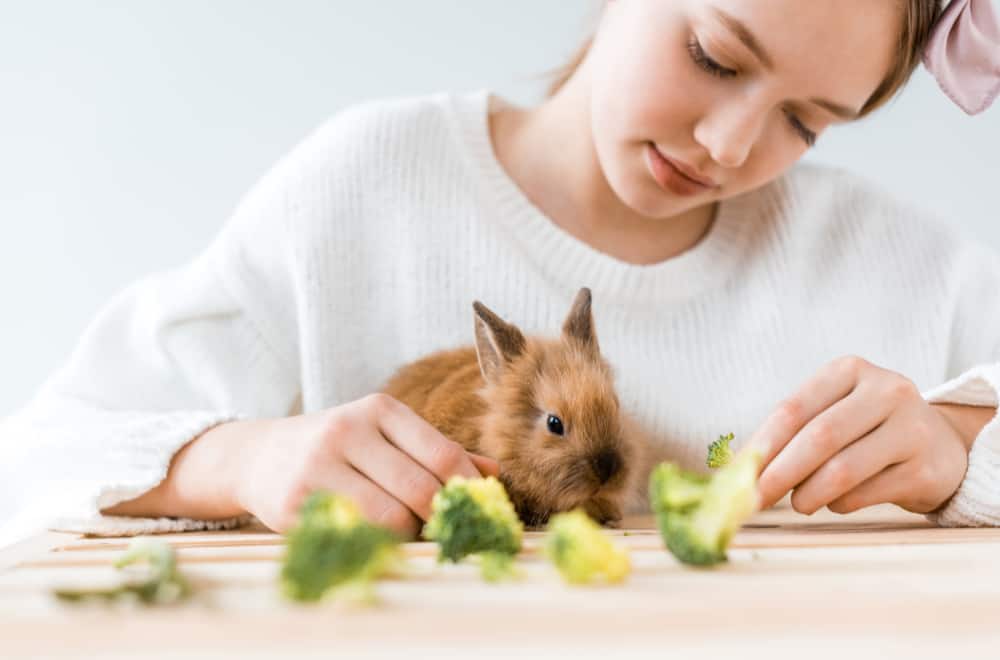
Always prepare broccoli for your bunny appropriately to minimize negative consequences:
- Pick out well-quality broccoli, preferably organic
- Carefully wash leaves, stems, and flowers to remove potentially harmful chemicals
- Separate flowers and cut stems into small-sized pieces
- Make a yummy mix with three or four other veggies and provide enough water
- Provide a moderate veggie amount to protect your pet from digestive system issues
Broccoli Benefits for Rabbits

All broccoli parts, including flowers, leaves, and stalks, are suitable to feed your rabbit as long as you serve them raw. When offered in moderate amounts, it is a healthy addition to your pet’s menu but is not a recommended food for everyday use.
This greenery provides necessary water, micronutrients, and a highly appreciated diversity in diet. It is also packed with fibers, while its crunchiness protects rabbit’s teeth from dental infections and helps them wear and clean correctly.
This veggie contains sulforaphane crucial for keeping high blood pressure under control and treating atherosclerosis. Vitamin A prevents eye issues, while vitamin C is critical to skin lesions prevention and healing.
Broccoli Risks for Rabbits
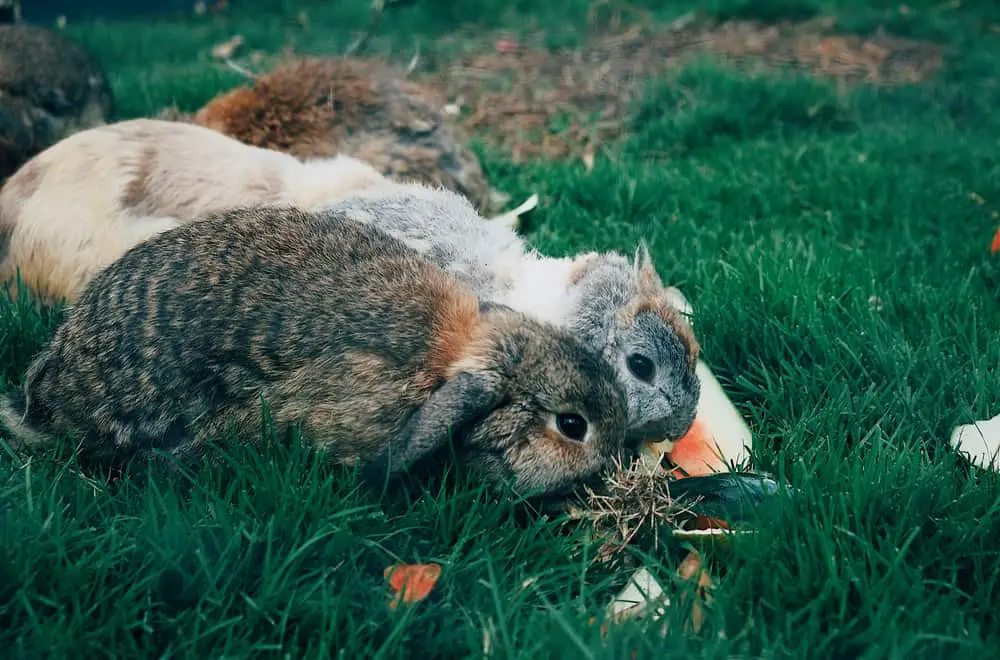
As I have already mentioned, you should never offer too much broccoli to your bunny since even a moderate amount causes gas accumulation in its stomach. It is also possible that your pet doesn’t like this veggie’s taste and smell and avoids consuming it.
On the other hand, some rabbits like eating broccoli, but their stomachs can’t tolerate it. Therefore, it is better to pick out other vegetables instead. Always introduce it gradually and continue only when there are no adverse reactions.
Remember that too much broccoli may cause stabbing pains and loss of appetite in sensitive rabbits because it contains high sugar levels. This ingredient kills good gut bacteria and causes short-term digestive issues, including loose stools and problems with immunity in the long term.
Broccoli Alternatives for Rabbits
- Beet, Swiss chard, dandelion, and turnip greens
- Romaine, Bibb, and butter lettuce
- Arugula, spinach, escarole, and clover
- Cilantro, mint, basil, and parsley
- Carrot and radish tops
- Radish and okra leaves
- Brussels sprouts
- Wheatgrass
- Beets, Squash, turnips, and carrots
- Bell peppers
- Cabbage, Fennel, and endive
- Bok Choy and Yu Choy
Summary
Broccoli is a superfood for humans, but you should be careful when offering it to your bunny. This nutritious veggie can benefit your long-eared buddy but only in small amounts. Otherwise, it will suffer from painful and potentially dangerous gas accumulation in the stomach and intestines.
